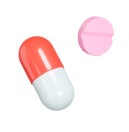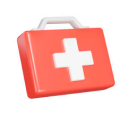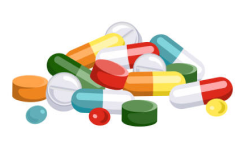Uses
What are Complex Motor Disorder Medications for?
| Medicine | How does the medicine work? |
| Antispasmodics e.g. Baclofen |
Helps muscles to relax. This will help your child to move, and make it easier and less painful to move them. It may also help to reduce muscle pain. |
| Anticholinergics e.g. Benzhexol |
In children with dystonia, the muscles have contracted too much and are too tight. The head, arms or legs are held in awkward or uncomfortable positions. Benzhexol blocks the effects of a chemical messenger called acetylcholine that is released from the nerves to make the muscle contract. It helps the muscles to relax. This should allow a better range of movement in the affected part of the body and reduce painful spasms. |
Benzodiazepines e.g. diazepam, nitrazepam, clonazepam |
Helps to reduce symptoms of spasticity, and other movement disorders such as dystonia, and myoclonus. It modifies the chemical transmission in the brain. It helps your child’s muscles to relax. This should also help to reduce muscle pain. |
| Chloral Hydrate | Helps to reduce symptoms of dystonia by modifying the chemical transmission in the brain. It is also used in children with sleep-onset disorder (difficulty getting to sleep), muscle spasm/dystonia and agitation. |
| Clonidine | Helps to reduce symptoms of dystonia by modifying the chemical transmission in the brain. It is also used in children with Tourette’s syndrome, attention-deficit hyperactivity disorder (ADHD) and sleep-onset disorder (difficulty getting to sleep). |
| Gabapentin | Helps to reduce symptoms of dystonia by modifying the chemical transmission in the brain. It also helps to reduce muscle pain and neuropathic pain (nerve pain). |
| Levodopa e.g. Madopar |
Levodopa is absorbed by the brain cells and turned into the chemical dopamine, which is used to transmit messages between the parts of the brain and nerves that control movement. Increasing the levels of dopamine helps to improve movement problems. |
How should I take or use Complex Motor Disorder Medications?
Your doctor will instruct you on how much and how often your child should take the medicine. Do not take more of the medicine or take it more often than what the doctor tells your child to. Most medicines can be taken with or without food. Give the medicine at the same time each day.
The medicine starts to work straight away. However, because the dose is usually increased gradually, it may take some weeks before the full effects can be seen.
Do not stop taking the medicine without first checking with the doctor.
What should I do if I forget to take or use Complex Motor Disorder Medications?
If your child misses a dose, give it as soon as you remember. However, if it is almost time for the next dose, skip the missed dose and continue with the regular dosing schedule. Do not double the dose to make up for the missed dose.
Side Effects
What are some common side effects of Complex Motor Disorder Medications?
We use medicines to make our children better, but sometimes they have other effects that we don’t want (side-effects).
| Medicine | Rare but serious side effects | Common side effects |
| Antispasmodics e.g. Baclofen |
Seek medical attention immediately if your child has any of these side effects:
|
If your child has problems with these less serious side effects, talk with your doctor/ pharmacist.
|
| Anticholinergics e.g. Benzhexol |
|
|
| Benzodiazepaines, e.g. Diazepam, Nitrazepam, Clonazepam |
|
|
| Chloral Hydrate |
|
|
| Clonidine |
|
|
| Gabapentin |
|
|
| Levodopa e.g. Madopar |
|
|
There may, sometimes, be other side-effects that are not listed above. If you notice anything unusual and are concerned, please contact your doctor or pharmacist.
Handling
How should I store Complex Motor Disorder Medications?
- Keep away from children
- Keep in a cool, dry place, away from direct sunlight
Disclaimers
If you take more than the recommended dose, please seek medical advice immediately. The information provided on this page does not replace information from your healthcare professional. Please consult your healthcare professional for more information.
This article is jointly developed by members of the National Medication Information workgroup. The workgroup consists of cluster partners (National Healthcare Group, National University Health System, and SingHealth), community pharmacies (Guardian, Unity, and Watsons), and the Pharmaceutical Society of Singapore. The content does not reflect drug availability and supply information in pharmacies and healthcare institutions. You are advised to check with the respective institutions for such information.
Contributed by
Last Updated on December 2024

Need More Medicine?
Use Medicine Order Service on HealthBuddy.

Medicines Reminder
Get reminders and chart progress on HealthBuddy.




















